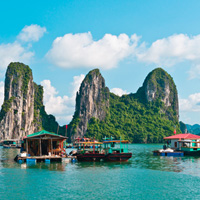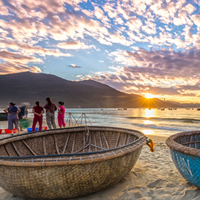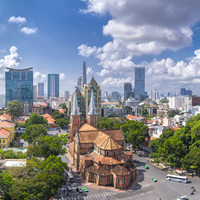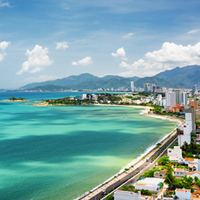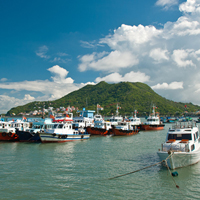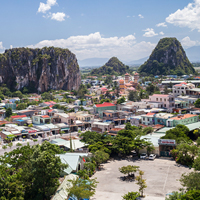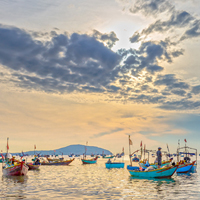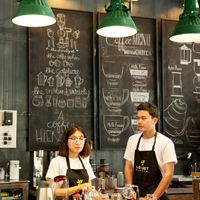Vietnam
Coastal BeachesVietnam is a Southeast Asian country known for its stunning landscapes, rich history, and vibrant culture. It is long and narrow, stretching over 1,650 kilometers from north to south, with a coastline along the South China Sea. The northern part of the country is dominated by the Red River Delta and the capital city, Hanoi, a place of historical significance and colonial architecture. To the north, the mountainous regions are home to various ethnic minorities and spectacular terraced rice fields, particularly in Sapa. Central Vietnam is characterized by the ancient city of Hue, the UNESCO-listed town of Hoi An, and the dynamic city of Da Nang, near the famous Marble Mountains. The southern part of Vietnam is anchored by Ho Chi Minh City (formerly Saigon), a bustling metropolis that is the economic heart of the country. The Mekong Delta in the south is a fertile region crisscrossed by waterways, which are the lifeblood of the rice cultivation and fishing industries there. Vietnam's history is marked by periods of Chinese, French, and American influence, which are reflected in its cultural heritage, cuisine, and architecture. The country is also known for its beaches, such as those found in Nha Trang and Phu Quoc Island, which offer opportunities for relaxation and water sports. Despite the scars of war, Vietnam has emerged as a rapidly developing economy and a popular tourist destination, offering a mix of historical sites, natural beauty, and modern amenities.
 AGS Worldwide Movers
AGS Worldwide MoversGet Quote
Relocating abroad soon? Make your move with AGS! AGS Worldwide Movers is a leader in the international moving industry. Our experience and expertise allows us to guarantee our clients the best quality moving services.
 AGS Worldwide Movers
AGS Worldwide MoversRelocating abroad soon? Make your move with AGS! AGS Worldwide Movers is a leader in the international moving industry. Our experience and expertise allows us to guarantee our clients the best quality moving services.
Get Quote
Living in Vietnam
Best Places to Live in Vietnam
Visa & Residency
Obtaining a residency in Vietnam involves several steps and can vary depending on the type of visa. For expatriates looking to reside in Vietnam, the most common types of visas are the Temporary Residence Card (TRC) and the Business Visa (DN). The TRC can be valid for up to three years and is suitable for those who are employed or have family ties in Vietnam. To apply for a TRC, expats must first have a job with a Vietnamese company or be married to a Vietnamese citizen. The sponsoring entity or individual must provide necessary documents, such as a business license or marriage certificate, along with the applicant's passport and visa application form. The Business Visa (DN) is popular among expats and digital nomads who may not qualify for a TRC. It is typically issued for three to twelve months and can be extended. To obtain a DN visa, applicants must have a sponsor, which can be a Vietnamese company inviting them for business purposes. The process involves submitting a visa application form, a sponsorship letter from the company, and a passport valid for at least six months. Digital nomads often opt for the DN visa due to its flexibility and the relative ease of finding a sponsoring company. However, it's important to note that while the DN visa allows for a long-term stay, it does not grant the holder the right to work in Vietnam. Those wishing to work must obtain a work permit in addition to the visa. The process of obtaining a residency visa in Vietnam is considered average in terms of difficulty. It requires careful preparation of documents, an understanding of the legal requirements, and sometimes the assistance of a legal or expert. The Vietnamese government has been known to change visa policies, so it's crucial for expats to stay informed about the current regulations. Overall, with the correct documentation and a valid sponsor, expats can navigate the visa process successfully.
Healthcare in Vietnam
Vietnam's healthcare system is a mix of public and private services. The public healthcare system is under the management of the Ministry of Health and provides services at three levels: central, provincial, and district. The quality of public healthcare varies, with urban areas typically having better facilities and more skilled medical staff than rural areas. Private healthcare in Vietnam has been growing, offering higher quality services with more modern facilities and shorter waiting times, but at a higher cost. Public healthcare is generally affordable for locals, but can still be a significant expense for those without insurance. Private healthcare is more expensive, but still affordable by Western standards. Expats and digital nomads can access public healthcare, but it is recommended that they have health insurance to cover the costs. Many expats choose private healthcare due to the higher standard of care and the language barrier in public hospitals.
Cost of Living
The cost of living in Vietnam is generally low compared to Western standards. Essentials such as food, housing, and transportation are quite affordable, making it a popular destination for expatriates and retirees.
Weather
Vietnam experiences a tropical climate in the south and a monsoonal climate in the north with a hot, rainy season from May to September and a warm, dry season from October to March. Northern areas can be cooler during the winter months, while the central region can experience typhoons and heavy rains between August and November. The southern part is generally hot and humid throughout the year.
Educational System in Vietnam
The educational system in Vietnam is known for its rigorous curriculum and competitive nature. Education is highly valued, and the system is structured into five levels: preschool, primary school, secondary school, high school, and higher education. Children typically start their formal education at the age of six, beginning with five years of primary education. This is followed by four years of secondary education and three years of high school education. The academic year in Vietnam usually starts in September and ends in May or June, with students graduating from high school around the age of 18. The Vietnamese government mandates that all children attend school until they complete the secondary level. The quality of education can vary significantly between urban and rural areas, with urban schools often having better facilities and resources. Public schools are free, though there are additional fees for things like maintenance and extra-curricular activities. Private and international schools are also available, offering different curricula and often higher quality education, but at a cost. These schools are popular among expatriates and affluent families. The grading system in Vietnam is based on a 10-point scale, with a score of 5 usually being the minimum passing grade. The education system places a strong emphasis on mathematics, sciences, and moral education. Students are also required to learn English, which is considered a key subject for their future career prospects.
Universities in Vietnam
The university system in Vietnam has been undergoing significant changes to improve its quality and meet international standards. There are both public and private universities, with the public ones being more prestigious and competitive. The academic year at Vietnamese universities typically starts in September and ends in June, with some variations depending on the institution. Undergraduate degrees usually take four years to complete, while certain professional degrees, like medicine or architecture, may take longer. Graduate programs, including master's and doctoral degrees, are also available and vary in length. Admission to universities is highly competitive, with entrance exams being a crucial determinant for placement. The government has been investing in higher education to increase accessibility and improve research capabilities. Foreign students are welcomed, and there are programs available in English, especially at the graduate level. Costs for attending university in Vietnam are generally lower than in Western countries, but they can vary depending on the institution and program. Living expenses in Vietnam are also relatively affordable, making it an attractive destination for international students. Scholarships and financial aid opportunities are available but may be limited. The focus on improving the quality of higher education is evident through the increasing number of partnerships with foreign universities and the emphasis on international accreditation.
Copyright 1997-2025 Burlingame Interactive, Inc.

